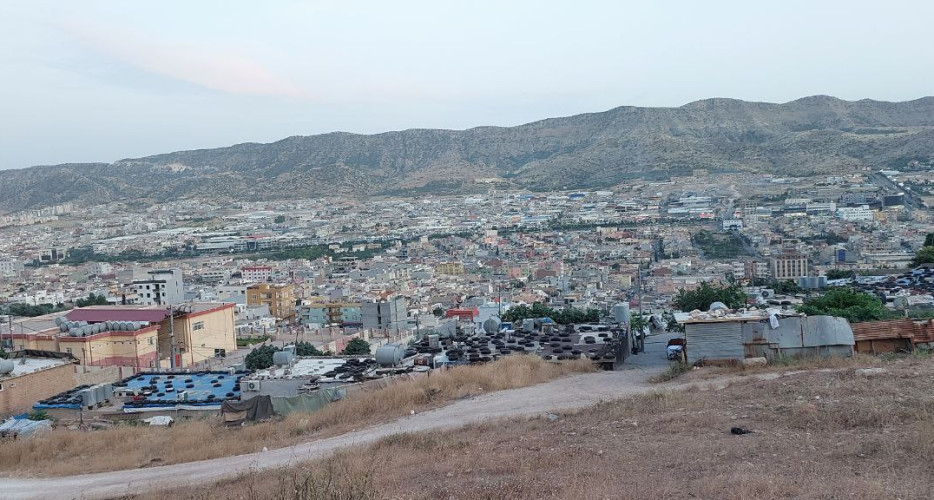
Peregraf- Ammar Aziz
Duhok governorate will remain the poorest part of the Kurdistan Region. According to the federal Ministry of Planning, it has held this ignominious title for the last sixteen years and there seems to be little chance of catching up with its regional neighbors anytime soon.
"There are people in Duhok who have only two meals a day or they have taken their children out of school because of poverty," said Dlovan Sadiq, an activist and journalist in the governorate.
He noted that many local young people are either migrating to Europe or are hoping to do so soon because of the lack of opportunity at home.
"This government does not care. Not only do they have no plans to reduce poverty, but they do not care about it," Sadiq said.
According to the latest statistics from the Ministry of Planning, Duhok is the poorest governorate in the Kurdistan Region, followed by Erbil and Sulaimaniyah, including Halabja. Its unemployment rate is also higher than the other two areas. Overall, Muthanna, located in the desert southwest of Nasiriyah on the Saudi border, is the poorest governorate in Iraq.
Shamoun Shlimon, deputy governor of Duhok for administrative affairs, disputed the accuracy of the federal numbers, saying that "we should not rely on these statistics 100 percent." However, he conceded that numbers from the Kurdistan Regional Government (KRG) also showed that Duhok was the most impoverished part of the Region.
According to the KRG’s Statistics Board, Duhok is the poorest governorate with a poverty rate of 8.6 percent, followed by Erbil with 6.7 percent and Sulaimaniyah with 4.46 percent.
"I do not hide it: there’s poverty in Duhok province," Shlimon told Peregraf.
He blamed the situation on the large number of displaced people. According to the latest numbers from the KRG’s Joint Crisis Coordinating Centre, there are at least 367,643 displaced people living in camps and cities in the governorate, including 282,742 IDP and 84,901 refugees.
In his interview with Peregraf, however, the deputy governor inaccurately cited a figure more than twice as high as this.
The presence of internally displaced Iraqis and refugees "has a direct impact on the population of the governorate," Shlimon said. "They need water, electricity, health, education, and all sectors and that takes money."
He also claimed that the calculation of the poverty rate used a population estimate that did not include the displaced population, but included their impact.
Duhok’s high level of poverty contrasts with its wealth of natural resources. Just over half of the Kurdistan Region’s oil production comes from fields in Duhok.
"I graduated sixteen years ago, but I still cannot earn sufficient income for myself and my family. It is very difficult to find a job and it has become my biggest dream," Kazhin Barwari told Peregraf.
The 33-year-old from Chamanke district of Amedi district has a bachelor’s degree from the College of Management and Economics and has sent her CV to many places in the public and private sector, but has been unable to land a job.
"The oil fields in Amedi, especially Chamanke district, may produce the equivalent of two or three other districts…but it is still the poorest area and people like me are still unemployed," Barwari said.
In addition to its oil wealth, Duhok is strategically located on the borders of Turkey and Syria and is near Mosul. This means that a large volume of trade flows through the governorate, but the majority of the local population does not benefit.
It is also a tourism hotspot. Many people from central and southern Iraq travel there to the cooler mountains during holidays. Two million tourists visited the governorate last year, out of the six million total who came to the Kurdistan Region as a whole.
"There are many reasons for the poverty rate in Duhok, including unfairness in [the allocation of] projects, as the government pays more attention to Erbil. This is the result and background of the conflict between the PUK and the KDP," Hashim Zebari, an economist and university professor, told Peregraf, referring to the Kurdistan Democratic Party and the Patriotic Union of Kurdistan.
Zebari also pointed to the government’s failure to invest in the private sector and sa lack of local industry, which reinforces the governorate’s reliance on imports.
Shlimon said that the provincial government has plans to reduce poverty in Duhok, but lacks the funds to implement them. While local officials collect large amounts of revenue, they do not have the power to allocate it locally. The money goes to the KRG Council of Ministers in Erbil, which centrally decides how to spend public money.
"I will not hide from you that the cabinet is betraying Duhok governorate. We have often asked to increase the budget of Duhok in all sectors, but to no avail," he said.
Still struggling with unemployment, Sadiq blamed "corruption and social injustice" for the governorate’s poverty.
"The people in power prey on the welfare of the citizens of this province and through this income have become millionaires," he said.